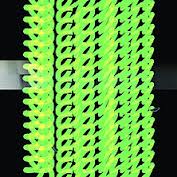 The use of Daphni as a distinction between the bulk of Dan Snaith's work done as Caribou is more than just an attractive new coat of paint or the result of yet another frivolous lawsuit. As Daphni, Snaith takes the elements of electronic music and dance that inspired much of 2010's Swim and extracts all semblance of outside influence, leaving a pretty faithful, smirkless take on house music. To me, Daphni is a way for Snaith to immerse himself into a subculture he's only been a tourist to. Here he can be a face in a crowd, playing freely with ideas instead of living up to a reputation.
The use of Daphni as a distinction between the bulk of Dan Snaith's work done as Caribou is more than just an attractive new coat of paint or the result of yet another frivolous lawsuit. As Daphni, Snaith takes the elements of electronic music and dance that inspired much of 2010's Swim and extracts all semblance of outside influence, leaving a pretty faithful, smirkless take on house music. To me, Daphni is a way for Snaith to immerse himself into a subculture he's only been a tourist to. Here he can be a face in a crowd, playing freely with ideas instead of living up to a reputation.
The best moments are the small wonders. The subtle drum fills between the choruses in Dan's take on afrobeat group Cos-Ber-Zam's minor hit "Ne Noya," for example, outweigh most of the song's other parts. The incessant escalating melody that colors the break is a means to an end, a tiny little punctuation which makes the stuff before it worthwhile. This is what I usually like best about Dan Snaith's work as of late. He understands how to have a conversation between instruments that seems natural even when they're becoming more predominantly sequencers and samplers than live drums and guitars. When put into the role of a strictly electronic producer, you have to do something besides layer sounds dispassionately. He knows, as a drummer, that timbre and dynamics have to change to keep a song interesting.
Having said that, however, there is a fair amount of fluff in a record like Jiaolong, as there is bound to be while Snaith learns to understand the nuances of the genre he's tackling. While not a totally new conception—Dan has been playing in night clubs under the name since last year—it does bear some level of amateur naivety to how he assembles his songs. I said that the majority of these songs are a means to an end, and I mean it; depending on the song, the core melodies here can be subtly pretty or mostly ignored. When those small wonders decrease in quantity, it is easy to feel like some of the songs are overlong."Pairs" is especially guilty, where it takes over half the song for develop any kind of rhythmic variation. Once it does, I found myself clinging on, mesmerized by the scarce hand drums and singular claps. "Ahora" works similarly, introducing some distant drones over polyrhythms in a rudimentary way but evolving just enough as to avoid being pigeonholed as background noise. "Springs" is more active with its abusive synth bursts and frantic loops, which I imagine makes for an impressive live performance.
Those minor bits of inspiration are what I treasure in electronic music, and I think Dan Snaith realizes that his knack for finding them sets him apart. I like listening to Jiaolong because it's like solving puzzles: there's little quirks and bumps that make it all work, and I have to listen over and over to catch how those pieces fit. I just wish there were more pieces here.
samples:
Read More


